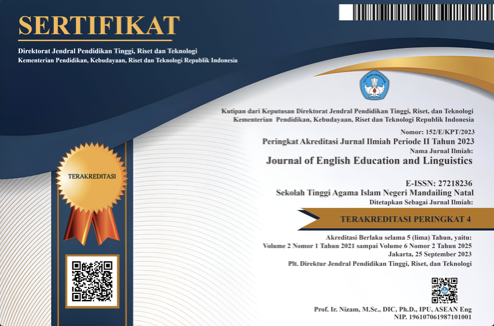FLASH (FUN LEARNING ENGLISH) WITH PICTIONARY FOR VOCABULARY ENAHNCHING ON RURAL STUDENTS
DOI:
https://doi.org/10.56874/jeel.v2i2.568Abstract
Learning English for some students were getting bored and less fun. It makes them become lazy and unserious to following the class. Especially, in rural students with local language user for learning the foreign language. Teaching English will become the difficult way for English teacher who teach in seven grade students on MTs S Ittihadiyah Aek Korsik Desa Parimburan Kecamatan Sungai Kanan Kabupaten Labuhanbatu Selatan North Sumatera. Vocabulary is the basic and the important aspect of language in order to easier to able to speak, to read, to write and to listen. FLASH (Fun Learning English) with Pictionary as a teaching strategy were designed and adapted by English teacher. It can help the students feel comfortable, fun, active and more motivated when they were enhaced their vocabulary during the learning process. The author conducted the data by using classroom observation and test including a series of processes to identify the problem that are appearing. The analysis showed how the pictionary gave the enhancing the students on knowing, memorizing and pronouncing the word.
Keywords : Pictionary, Vocabulary, Fun Learning English.
References
Akrimah, R. Y. (2017). Teaching Vocabulary Through Pictionary Game To. 1–10. Andrew Wright, D. B. and M. B. (2001). Games for Language Learning.
An-nisa, N., & Suwartono, T. (2020). Fun Ways in Learning English Journal of Applied
Linguistics Fun Ways in Learning English. August.
Chirandon, A., Prof, A., Laohawiriyanon, C., & Rakthong, A. (2010). The Effects of Teaching
English through Games. The International Conference on Graduate Students Research Work (PENA2009), 1–8. http://fs.libarts.psu.ac.th/research/conference/proceedings- 2/4pdf/006.pdf
DARFILAL, I. (2015). The Effectiveness of Using Language Games in Teaching Vocabulary The Case of Third Year Middle School Learners.
Davidovich, M. V., Alexeev, O. Y., & Borisov, V. S. (2004). Direct and inverse problems solutions for coaxial and waveguide probes. 15th International Conference on Microwaves, Radar and Wireless Communications, MIKON - 2004, 1(1), 186–189. https://doi.org/10.1109/mikon.2004.1356893
Hamer, W., & Lely, L. N. (2019). Using Pictionary Game to Increase Learners’ Vocabulary Mastery in English Language Instruction. Journal of English Education Studies, 2(1), 43– 51. https://doi.org/10.30653/005.201921.30
Hornby, A. S., Gatenby, E. V, & Wakefield, H. (1963). The Advanced Learner`s Dictionary of Current English.
International Institute for Educational Planning, U. (2003). Law on the National Education System (No. 20/2003). https://www.ilo.org/dyn/natlex/natlex4.detail?p_isn=84435&p_lang=en
Naganathan, & GangaLakshmi. (2019). E-Learning Using Pictionary And Google Classroom – A Flipped Classroom Methodology. The Online Journal of Distance Education and E- Learning, 7(1), 15–22.
Parmiti, D. P., Sulastri, M., & Pudjawan, I. K. (2017). PROGRAM IPTEKS BAGI MASYARAKAT (IbM) PENDIDIKAN DI DESA TERPENCIL. Jurnal Widya Laksana, 5(2), 100. https://doi.org/10.23887/jwl.v5i2.9097
Shabaneh, Y., & Farrah, M. (2019). the Effect of Games THE EFFECT OF GAMES ON VOCABULARY RETENTION. Indonesian Journal of Learning and Instruction, 2(01). https://doi.org/10.25134/ijli.v2i01.1687
Silalahi, M. (2019). Improving Students’ Interest in Learning English by Using Games. 1(1), 50– 56.
Suyanto, K. K. . (2008). English For Young LearnersEnglish For Young Learners. Budi Aksara. https://www.belbuk.com/english-for-young-learners-p-58.html
Tahmit, M., & Nastiti, N. D. (2019). Improving Student Vocabulary Mastery Through The Pictionary Words Game in Fifth Grade of Madrasah Ibtidaiyah Tarbiyatul Athfal Sumurber. Kontribusia (Research Dissemination for Community Development), 2(2), 34. https://doi.org/10.30587/kontribusia.v2i2.1007
Thi, D., Lan, H., Van, D. T., & Huyen, P. M. (2019). The Effectiveness of Language Games in Teaching Vocabulary among First-year Students at Thai Nguyen University of Economics and Business Administration , TNU. 9(2), 76–82. https://doi.org/10.9790/1959-0902017682
Wulanjani, A. N. (2016). The Use of Vocabulary-Games in Improving Children’s Vocabulary in English Language Learning. Tranformatika, 12(1), 76–83.
Downloads
Published
Issue
Section
License
All articles published in the Journal of English Education and Linguistics are licensed under a Creative Commons Attribution-ShareAlike 4.0 International (CC BY-SA) license. This means anyone is free to copy, transform, or redistribute articles for any lawful purpose in any medium, provided they give appropriate attribution to the original author(s) and Journal of English Education and Linguistics, link to the license, indicate if changes were made, and redistribute any derivative work under the same license.
Copyright on articles is retained by the respective author(s) without restrictions. A non-exclusive license is granted to the Journal of English Education and Linguistics to publish the article and identify itself as its original publisher, along with the commercial right to include the article in a hardcopy issue for sale to libraries and individuals.
Although the conditions of the Creative Commons Attribution-ShareAlike 4.0 International (CC BY-SA) license do not apply to authors (as the copyright holder of your article, you have no restrictions on your rights), by submitting to the Journal of English Education and Linguistics, authors recognize the rights of readers and must grant any third party the right to use their articles to the extent provided by the license.

This work is licensed under a Creative Commons Attribution-ShareAlike 4.0 International License.








